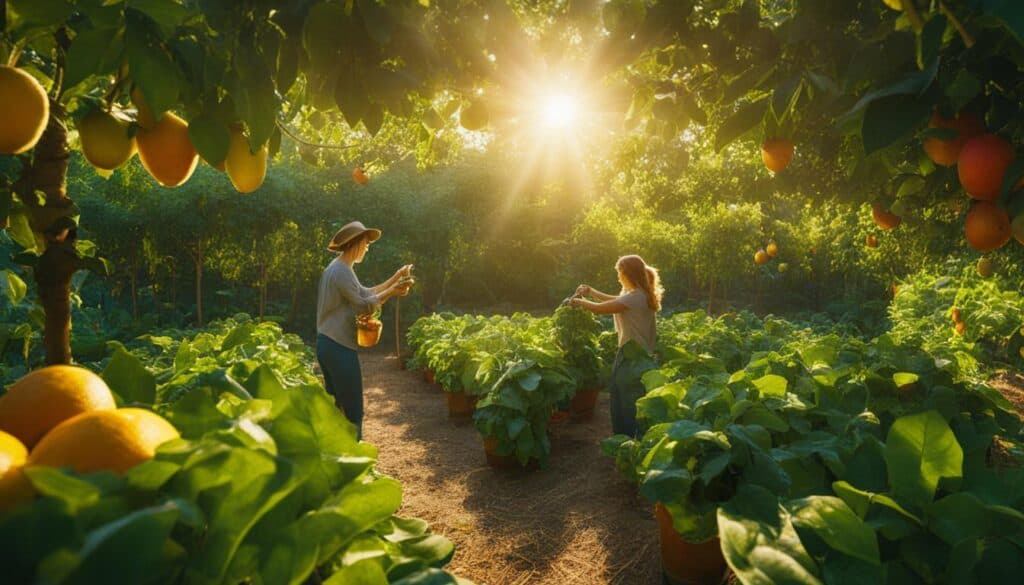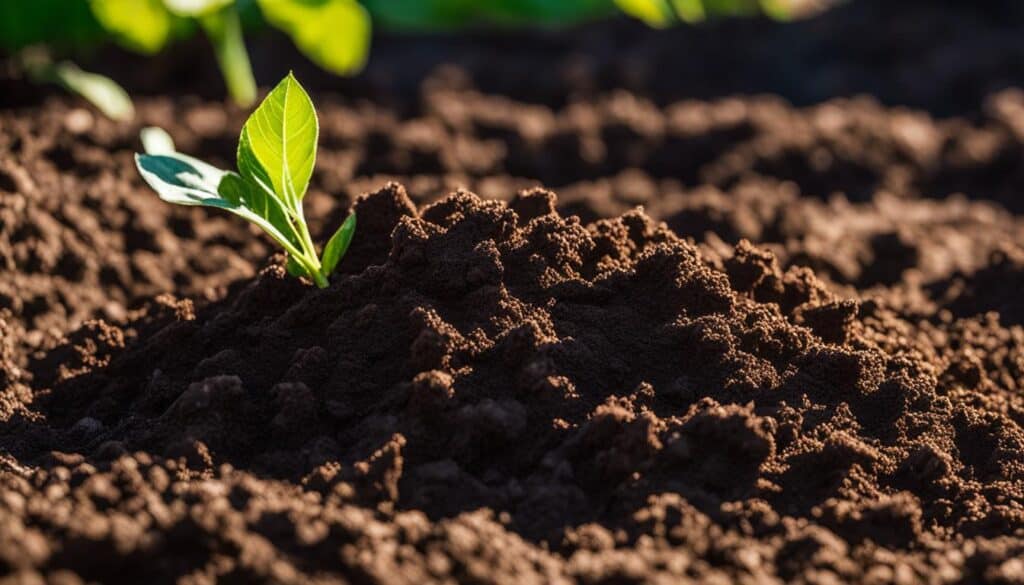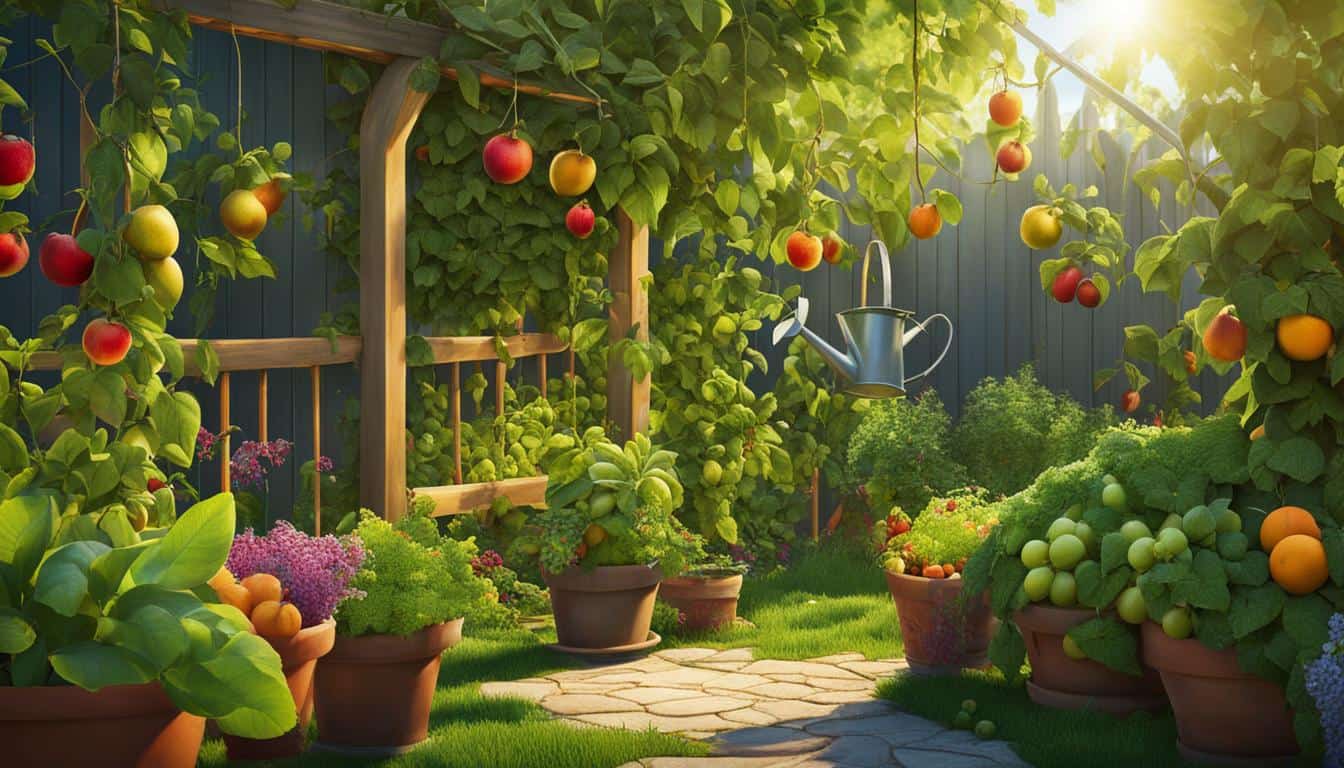Growing your own fruit plants can be a delightful and fulfilling experience. It not only allows you to enjoy the fresh flavors of homegrown fruits but also provides numerous benefits for your overall well-being. Whether you have a large backyard or a small urban garden, planting fruit trees and nurturing fruit plants can bring you closer to nature and promote a healthier lifestyle.
From selecting the best fruit plants for your garden to caring for them throughout the seasons, the process of fruit gardening offers endless opportunities to connect with nature and savor the rewards of your efforts. Let’s dive deeper into the world of fruit plants and discover why growing your own backyard orchard is a joyful journey.
Key Takeaways:
- Growing your own fruit plants allows you to enjoy fresh and flavorful rewards.
- Fruit plant gardening promotes a healthier lifestyle through outdoor activities.
- Connecting with nature through fruit planting nurtures your mind and soul.
- Having a diverse backyard orchard provides variety and seasonality in your harvest.
- Planting and caring for fruit plants contributes to sustainable living.
Connecting with Nature through Fruit Plant Gardening
Growing your own fruit plants allows you to connect with nature in a profound way. Planting, nurturing, and observing the growth of fruit plants create a deep sense of connection and responsibility. Spending time in your backyard orchard allows you to appreciate the beauty of nature firsthand and reconnect with the seasons.
The Joy of Witnessing Growth
When you plant a fruit tree or a berry bush, you become a part of its journey from a tiny seed or cutting to a thriving plant. Witnessing the growth and development of your fruit plants is a truly rewarding experience. From the first tender leaves that sprout to the blossoms that burst into vibrant colors, every stage of growth fills you with a sense of wonder and awe.
Harvesting the Fruits of Your Labor
As the seasons change, so does your backyard orchard. Each fruit plant has its own unique life cycle, offering you a diverse and ever-changing landscape. From the sweet fragrance of ripe peaches in the summer to the comforting taste of crisp apples in the fall, your garden becomes a treasure trove of flavors and aromas. Harvesting the fruits of your labor is a joyful celebration of nature’s abundance.
Nurturing a Sustainable Ecosystem
By cultivating fruit plants in your backyard, you play a vital role in supporting a sustainable ecosystem. Fruit trees and plants attract bees, butterflies, and other pollinators, contributing to the overall health of the environment. As you care for your plants and create a welcoming habitat, you become a steward of nature, fostering biodiversity and promoting a thriving ecosystem.
| Benefits of Connecting with Nature | Benefits of Fruit Plant Gardening |
|---|---|
| Reduces stress and improves mental well-being | Creates a deep sense of connection and responsibility |
| Promotes physical activity and exercise | Provides a diverse and ever-changing landscape |
| Increases appreciation for the beauty of nature | Supports a sustainable ecosystem |
Connecting with nature through fruit plant gardening offers numerous benefits for your well-being and the environment. It allows you to witness the wonders of growth, harvest the delicious rewards of your labor, and nurture a sustainable ecosystem. Embrace the beauty of nature by cultivating your own backyard orchard and immerse yourself in the joy of fruit plant gardening.
Health Benefits of Growing Fruit Plants

Growing fruit plants in your own backyard not only allows you to enjoy the delicious flavors of homegrown produce but also provides numerous health benefits. Engaging in fruit gardening activities can improve your physical fitness, mental well-being, and overall quality of life.
One of the key health benefits of growing fruit plants is the opportunity for moderate exercise. Planting, pruning, and harvesting fruits require physical effort, which can help improve cardiovascular health, strength, and flexibility. These activities also contribute to burning calories and maintaining a healthy weight.
Spending time outdoors in your fruit garden exposes you to natural sunlight, which is a great source of vitamin D. Vitamin D is essential for bone health, immune function, and mood regulation. Soaking up the sun while tending to your plants can reduce stress levels and improve your mental well-being.
Health Benefits of Growing Fruit Plants:
- Provides moderate exercise for improved cardiovascular health, strength, and flexibility.
- Exposure to sunlight promotes the production of vitamin D, benefiting bone health and mood regulation.
- Reduces stress levels and enhances mental well-being.
Furthermore, growing your own fruit plants allows you to have control over the use of pesticides and fertilizers. By opting for organic gardening practices, you can minimize exposure to harmful chemicals and enjoy the health benefits of consuming pesticide-free fruits.
Incorporating fruit gardening into your lifestyle not only ensures a fresh supply of nutritious fruits but also offers an enjoyable form of exercise and a way to connect with nature. So, start planting your favorite fruit plants and reap the many health benefits they provide.
| Health Benefits of Growing Fruit Plants | Summary |
|---|---|
| Provides moderate exercise for improved cardiovascular health, strength, and flexibility. | Physical activity involved in fruit gardening promotes overall fitness. |
| Exposure to sunlight promotes the production of vitamin D, benefiting bone health and mood regulation. | Natural sunlight obtained while tending to fruit plants enhances well-being. |
| Reduces stress levels and enhances mental well-being. | The therapeutic effects of gardening contribute to better mental health. |
| Control over pesticide and fertilizer use. | Organic fruit gardening minimizes exposure to harmful chemicals. |
The Health Benefits of Growing Fruit Plants:
“Planting and caring for fruit plants not only provides the satisfaction of a homegrown harvest but also offers a range of health benefits, from physical fitness to mental well-being.”
So, why not start your own fruit garden today and enjoy the many health benefits it brings? Not only will you have access to fresh and nutritious fruits, but you’ll also experience the joy of connecting with nature and promoting a healthier lifestyle.
Flavorful Rewards of Growing Your Own Fruit
Growing your own fruit plants comes with the delightful advantage of enjoying the flavorful rewards of your own harvest. When you pick a ripe apple straight from the tree or savor the sweetness of a freshly picked strawberry, you’ll experience a taste that is unparalleled in store-bought fruits. The difference lies in the fruit’s ripeness; by allowing it to mature fully on the tree, it develops a depth of flavor and aroma that commercial varieties often lack.
There is something truly satisfying about biting into a piece of fruit that you have nurtured from a tiny seed or sapling. The care you put into planting, pruning, and maintaining your fruit plants directly contributes to the exceptional taste and texture of the fruits they bear. Each bite becomes a testament to your effort and commitment.
“I never realized how incredible a fresh peach could taste until I grew my own. The flavors were so vibrant and intense, it completely transformed my appreciation for this fruit.” – Jane, passionate fruit gardener
Furthermore, growing your own fruit allows you to experiment with a wide variety of fruit cultivars that may not be readily available in stores. From heirloom apple varieties to exotic citrus fruits, your backyard orchard can become a treasure trove of unique flavors. By exploring different fruit plants, you can indulge in a diverse array of tastes and expand your palate beyond the ordinary.
Table: Flavor Comparison of Store-Bought and Homegrown Fruits
| Fruit | Store-Bought | Homegrown |
|---|---|---|
| Apple | Mild flavor, slightly tart | Complex flavors, sweet and tangy |
| Strawberry | Subtle sweetness | Intense sweetness with a hint of acidity |
| Peach | Juicy, but mild flavor | Intensely juicy with a rich, aromatic flavor |
| Blueberry | Mild sweetness | Sweet and tangy with bursts of flavor |
As you can see from the table, homegrown fruits generally offer a more robust and vibrant flavor profile compared to their store-bought counterparts. This stark contrast is what makes growing your own fruit plants such a rewarding and flavorful experience.
Variety and Seasonality in Your Backyard Orchard
Creating a backyard orchard not only allows you to savor the joy of growing your own fruit plants but also provides an opportunity to explore a wide variety of fruits that may not be easily available in grocery stores. From apples to peaches, berries to citrus, the options are endless when it comes to selecting fruit plants for your garden. By diversifying your fruit selection, you can enjoy a bountiful harvest throughout the year and experience the unique flavors and textures that each season brings.
In a backyard orchard, you have the freedom to handpick fruit plants that suit your taste preferences and thrive in your local climate. This means you can choose plants that are perfectly adapted to your region, ensuring a successful and productive harvest. Imagine stepping into your garden during the summer months and plucking ripe, juicy peaches straight from the tree, or indulging in freshly picked apples during the crisp fall season. The seasonal variety that a backyard orchard offers brings excitement and anticipation as you look forward to the different fruits that each season brings.
Not only does a diverse array of fruit plants add visual interest to your garden, but it also provides ecological benefits. By cultivating different types of fruits, you contribute to the overall biodiversity of your backyard. Each fruit plant attracts unique species of beneficial insects and birds, promoting a healthier and more balanced ecosystem. Additionally, the seasonal variety in your orchard helps to keep pests and diseases at bay, as different types of fruits are susceptible to different pests, reducing the likelihood of an infestation.
| Fruit | Season | Flavor |
|---|---|---|
| Apples | Fall | Crisp and tart |
| Peaches | Summer | Juicy and sweet |
| Strawberries | Spring | Refreshing and tangy |
| Citrus | Winter | Bright and zesty |
By creating a backyard orchard that embraces variety and seasonality, you can truly immerse yourself in the wonders of nature and enjoy a diverse, flavorful harvest year-round. Whether you’re a seasoned gardener or just starting out, growing your own fruit plants offers a rewarding and fulfilling experience. So, start planning your backyard orchard today and let the abundance of flavors and the beauty of each season come alive in your own garden.
Sustainable Living through Fruit Plant Gardening

Growing your own fruit plants not only allows you to enjoy the delicious fruits of your labor, but it also contributes to sustainable living. By embracing fruit plant gardening, you can make eco-friendly choices that have a positive impact on the environment. Let’s explore how fruit plant gardening promotes sustainability and how you can be a part of this movement.
Reducing Environmental Impact
One of the key benefits of fruit plant gardening is reducing our reliance on mass-produced crops. When you grow your own fruit plants, you minimize the transportation and packaging required to bring fruits from distant farms to your table. By eliminating the need for pesticides and synthetic fertilizers, you also reduce the release of harmful chemicals into the environment.
Growing your own fruit in a sustainable manner means opting for organic practices, which promote healthy soil, water conservation, and biodiversity. By nourishing the soil with compost and organic matter, you provide a rich habitat for beneficial insects, birds, and microorganisms that contribute to a balanced ecosystem.
Promoting Local Food Systems
Fruit plant gardening encourages the development of local food systems, which have a range of benefits. By growing your own fruit, you support local farmers and reduce your dependence on large-scale industrial agriculture. This helps to strengthen the local economy and fosters community connections.
Additionally, when you grow fruit plants in your backyard, you have the opportunity to share your harvest with neighbors, friends, and family. This promotes a sense of community and encourages a culture of sharing and reciprocity. By creating a network of backyard orchards, we can collectively reduce food waste and ensure that fresh, healthy fruits are accessible to all.
Nurturing a Sustainable Lifestyle
Fruit plant gardening is more than just a hobby – it’s a way of life that aligns with the principles of sustainable living. By growing your own food, you become more self-sufficient and reduce your carbon footprint. You gain a deeper appreciation for the seasons, the natural rhythms of life, and the interconnectedness of all living beings.
Embracing fruit plant gardening means embracing a mindful and intentional approach to food. It’s about choosing quality over quantity and savoring the flavors that nature provides. It’s about cultivating a deep connection with the earth and recognizing the importance of our role as stewards of the environment.
By incorporating fruit plant gardening into your life, you can contribute to a more sustainable future while enjoying the abundant rewards of your own backyard orchard.
Choosing the Right Fruit Plants for Your Garden

When it comes to growing fruit plants in your garden, choosing the right varieties is crucial for success. By considering factors such as your local climate, soil conditions, and available space, you can create an ideal environment for your fruit plants to thrive. Here are some key points to keep in mind when selecting fruit plants for your garden:
- Climate suitability: Different fruit plants have specific climate requirements. Some fruits, like apples and pears, thrive in cooler temperatures, while others, like citrus fruits, prefer warmer climates. Research which fruits are best suited for your region’s temperature range and choose accordingly.
- Soil conditions: Understanding your soil type is essential for choosing the right fruit plants. Some plants prefer well-drained soil, while others thrive in more acidic or alkaline conditions. Conduct a soil test to determine the pH level and nutrient content of your soil, and select fruit plants that are compatible with those conditions.
- Space availability: Consider the available space in your garden when selecting fruit plants. Some fruit trees can grow quite large and require significant space, while others are more compact and suitable for smaller gardens or containers. Plan accordingly to ensure your fruit plants have enough room to grow and bear fruit.
- Growing requirements: Different fruit plants have varying growing requirements, including sunlight exposure, watering needs, and pruning preferences. Research the specific care instructions for each type of fruit plant you are considering and assess whether you can provide the necessary conditions for their optimal growth.
By taking these factors into account, you can make informed decisions when choosing the right fruit plants for your garden. Remember, selecting fruit plants that are well-suited to your climate, soil conditions, and available space will increase the chances of a successful and fruitful garden.
Tips for Garden Planning
Before you start planting your fruit plants, it’s important to have a solid garden plan in place. Here are some tips to help you with your garden planning:
- Draw a garden layout: Sketch out a rough plan of your garden, indicating where you will plant each fruit plant. Consider factors such as sunlight exposure, spacing between plants, and accessibility for maintenance.
- Plan for succession planting: To prolong your fruit harvest, consider planting different fruit varieties that ripen at different times. This will ensure a more extended season of fresh fruits from your garden.
- Account for pollination: Some fruit plants require cross-pollination to produce fruit. Make sure you have a mix of compatible varieties or consider planting pollinator-friendly flowers nearby to attract bees and other pollinators.
- Consider companion planting: Certain plants have beneficial effects on others when grown together. Research different companion planting strategies to maximize the health and productivity of your fruit plants.
By following these tips and carefully planning your garden, you can create an environment that fosters the growth and abundance of your fruit plants.
| Fruit Plant | Climate Suitability | Soil Conditions | Space Requirements | Special Considerations |
|---|---|---|---|---|
| Apple | Temperate | Well-drained, slightly acidic | Large | Requires cross-pollination |
| Orange | Subtropical to tropical | Well-drained, slightly acidic | Medium | Requires full sun |
| Blueberry | Temperate | Acidic, well-drained | Small to medium | Requires acidic soil |
| Strawberry | Temperate | Well-drained, fertile | Small | Requires regular watering |
“Choosing the right fruit plants for your garden is the first step towards a successful harvest. Take into consideration your climate, soil conditions, and available space to ensure your fruit plants have the best chance to thrive. Don’t be afraid to experiment with different varieties, and remember to plan your garden layout and consider the needs of each plant. With careful selection and planning, you can enjoy the satisfaction of growing your own delicious fruits right in your backyard.”
Preparing Your Garden for Fruit Planting

Before you start planting your fruit plants, it’s essential to prepare your garden to ensure optimal growing conditions. Proper garden preparation is key to setting the stage for successful fruit plant growth and a bountiful harvest. Here are some important steps to follow:
Evaluating Soil Conditions
Assessing your soil’s texture, drainage, and fertility is crucial in determining its suitability for fruit planting. Different fruit plants have specific soil requirements, so it’s important to understand the needs of the plants you’ll be growing. Conduct a soil test to determine the pH level and nutrient content of your soil. This will help you make the necessary amendments to optimize soil conditions for your fruit plants.
Removing Weeds and Debris
Prior to planting, clear the area of any weeds, rocks, or debris that can hinder the growth of your fruit plants. Weeds compete with your plants for nutrients, sunlight, and water, so it’s important to remove them to give your fruit plants the best chance of thriving. Clearing the area will also improve air circulation and minimize the risk of disease or pest infestations.
Planning Sunlight Exposure
Fruit plants generally require full sun exposure to thrive and produce a bountiful harvest. Take note of the sun patterns in your garden throughout the day and plan your planting accordingly. Ensure that your fruit plants will receive a minimum of six hours of direct sunlight daily. This will help stimulate growth, encourage fruiting, and enhance the flavors of your harvest.
| Fruit Plant | Sunlight Requirements |
|---|---|
| Apple | Full sun (6-8 hours) |
| Strawberry | Full sun to partial shade (6-8 hours) |
| Citrus | Full sun (6-8 hours) |
| Peach | Full sun (6-8 hours) |
By carefully preparing your garden, you’ll create an ideal environment for your fruit plants to grow and thrive. This will ultimately lead to a bountiful harvest of delicious, homegrown fruits that you can enjoy throughout the season.
Planting, Pruning, and Caring for Fruit Plants
Growing fruit plants requires proper planting, pruning, and ongoing care to ensure healthy growth and abundant fruit production. By following these essential practices, you can optimize the success of your backyard orchard and enjoy a bountiful harvest.
Planting Fruit Plants
When planting fruit plants, it’s important to choose a suitable location that provides adequate sunlight and well-drained soil. Dig a hole that is deep and wide enough to accommodate the plant’s root system. Place the plant in the hole, ensuring that the roots are spread out and not crowded. Backfill the hole with soil, compacting it gently to eliminate air pockets. Water thoroughly after planting to settle the soil and promote root establishment.
Pruning Fruit Plants
Pruning is essential for shaping fruit plants, promoting proper airflow, and controlling their size. Start by removing any dead, damaged, or crossing branches. This helps to maintain the plant’s overall health and prevent the spread of diseases. Additionally, pruning stimulates new growth and encourages fruit production. It’s best to prune fruit plants during the dormant season, typically in late winter or early spring, before new growth begins.
Fruit Plant Care
Proper care is vital for the overall health and productivity of fruit plants. This includes regular watering, especially during dry periods, to ensure consistent moisture levels. Mulching around the base of the plants helps to retain moisture, suppress weeds, and regulate temperatures. Fertilize the plants according to their specific needs, considering soil conditions and nutrient deficiencies. Lastly, monitor your plants for any signs of pests or diseases and take appropriate measures to control them.
Summary
Planting, pruning, and caring for fruit plants are essential steps in creating a thriving backyard orchard. By providing the right growing conditions, shaping the plants through pruning, and ensuring ongoing care, you can enjoy the rewards of a fruitful harvest. Remember to choose varieties suited to your region, follow proper planting techniques, and provide regular maintenance to foster healthy growth and abundant fruit production.
Conclusion
Growing your own backyard fruit plants is a rewarding and fulfilling experience. It allows me to connect with nature and enjoy the flavorful rewards of my own harvest. Not only does it provide a sense of accomplishment, but it also promotes a sustainable lifestyle.
With proper planning, care, and attention, I can create a diverse backyard orchard that provides a bountiful harvest throughout the year. From apples to peaches, berries to citrus, I can tailor my garden to suit my taste preferences and explore a variety of fruits that may not be easily available in grocery stores.
Embracing the process of fruit plant gardening allows me to nourish my body, mind, and soul. It’s a therapeutic activity that brings me closer to nature and helps me appreciate the beauty of each season. So, why not join me in the joy of growing your own fruit plants and experience the countless benefits it brings?
FAQ
What are the benefits of growing your own fruit plants?
Growing your own fruit plants allows you to connect with nature, promotes a healthier lifestyle, and provides flavorful rewards.
How does growing your own fruit plants connect you with nature?
Planting, nurturing, and observing the growth of fruit plants create a deep sense of connection and responsibility, allowing you to appreciate the beauty of nature firsthand.
What health benefits does fruit plant gardening offer?
Engaging in gardening activities improves cardiovascular health, strength, and flexibility, reduces stress, and improves mental well-being.
Why are homegrown fruits more flavorful?
By allowing the fruit to ripen naturally on the tree, you can experience flavors that are often lacking in commercially grown fruits.
What variety of fruits can I grow in my backyard orchard?
From apples to peaches, berries to citrus, you can tailor your garden to suit your taste preferences and enjoy the flavors of each season.
How does growing your own fruit plants contribute to sustainable living?
Backyard fruit cultivation minimizes transportation, packaging, and pesticide use, making it an eco-friendly choice.
How do I choose the right fruit plants for my garden?
Consider your local climate, soil conditions, and available space to select varieties that are well-suited to your region and garden size.
How should I prepare my garden for fruit planting?
Assess your soil’s texture, drainage, and fertility and consider the amount of sunlight your plants will receive to ensure optimal growing conditions.
What is involved in planting, pruning, and caring for fruit plants?
Proper planting techniques, pruning for healthy growth, and regular care, including watering, fertilizing, and pest control, ensure the success of your fruit plants.





Leave a Reply